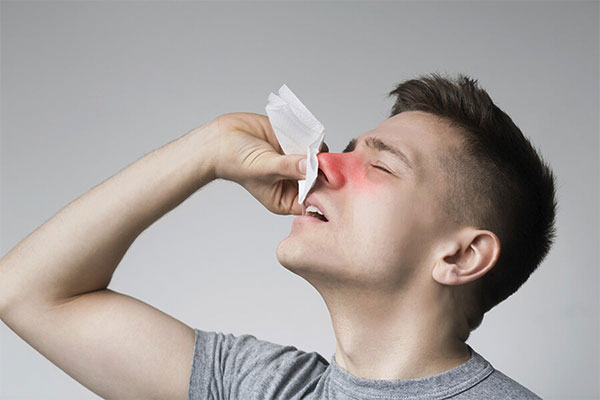Allergic rhinitis

Allergic rhinitis is an irritation and inflammation of some internal areas of the nose caused by allergens. Allergic rhinitis represents a global health problem. In Hong Kong, 1 in 4 people are suffering from rhinitis. Allergic rhinitis can be divided into two categories:
- Seasonal – e.g. allergic to pollen
- Perennial – e.g. allergic to dust, fungus or hair/fur
Symptoms
Patients with allergic rhinitis may experience a runny nose, sneezing over and over, nasal congestion, a tickle in throat or coughing caused by postnasal drip, watery and itchy eyes, and poor sleeping quality.
Common cold or Allergic rhinitis?
The main difference between “common cold” and “allergic rhinitis” is that cold symptoms usually last for a few days, but the symptoms of allergic rhinitis happen particular in the morning and evening time. The symptoms of allergic rhinitis may become worse in case of temperature change, dry air or lack of rest.
Causes and risk factors
Allergic rhinitis is caused frequently by exposure to perennial or seasonal allergens that exist in our indoor and outdoor environment.
Among the most common allergens, pollens (grass, trees, and weeds) are the predominant causes of seasonal allergic rhinitis. House dust mites, pets, and mould are the major causes of perennial allergic rhinitis.
Diagnosis
Doctor may use skin and blood tests to see how the patient’s body reacts to certain substances. Nasal endoscopy may be utilised according to certain patient conditions.
- Skin test – Doctor will prick the patient’s arm with tiny tubes that contain common allergens. If he/she is allergic to any of them, the skin will get red, itchy, or swollen at the test site.
- Blood test – it shows if the body makes blood proteins called antibodies in response to allergy triggers.
Treatment
So far there is no way to completely remove the allergic substances or cure allergy. Doctors usually prescribe anti allergic drugs to reduce patient discomfort:
- Oral anti-allergic drugs
- Steroid nasal spray
- Patients with persistent and severe nasal congestion can consider to have turbinectomy and radiofrequency inferior turbinate reduction to ease the symptoms.
Prevention
Here are some simple tips for citizens whether suffering allergic rhinitis or not:
- Try to find out the allergen and avoid contact with substances that may cause allergic reaction such as dust mite, pollen, fungus, etc.
- Keep home clean and ventilated
- Avoid growing flowering plants at home, nor keeping animals or birds
- Avoid hot, spicy food and alcohol
- Do not smoke
- Beware of climate fluctuations and sudden changes of temperature
- Air purifiers or air filters can be placed in the bedroom
*The above information is for reference only, please consult your doctor for detail.

 3405 8288
3405 8288
